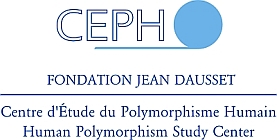Pr Jean Dausset, Prix Nobel de Médecine, 1980

Searching for genetic variants involved in the initiation, progression,
and response to treatment in breast cancer: the SIGNAL and PHARE studies.
The PHARE and SIGNAL projects, promoted by the French National Cancer Institute (INCa) since 2006 have enabled the collection of detailed clinical information and blood samples from respectively 1400 and 8120 breast cancer patients. This collection is enriched in patients presenting HER2 amplified tumors (roughly 3300 patients). Furthermore, in the context of the SIGNAL2-ICGC project, tumor fragments from certain patients have been collected. These biological resources offer the unique opportunity to study in greater detail genetic variants involved in the initiation, progression, and response to treatment in breast cancer.
We have chosen to take advantage of the large number of cases affected by tumors overexpressing HER2 to study the susceptibility of developing such tumors, as well as the resistance to Herceptin treatment and the predisposition to develop cardiotoxicity during this treatment. For each of these parameters, an initial characterization of loci associated is carried out, in order to identify functional polymorphisms for further study in collaboration with specialized biomedical research teams.
The project is divided into two phases. The objective of the first phase is to genotype the ensemble of individuals included in the PHARE and SIGNAL studies. A first stage consists of obtaining the genotypes for roughly 500 000 SNPs for each of the 9500 subjects available, using the Human Core Exome chip set from Illumina. A PCA analysis is then carried out in order to characterize the genetic heterogeneity of the population under study, and to identify any specific subgroups. Using this information, 2000 subjects are then selected as genetically representative of the overall population, and genotyped on more than 4 million SNPs (Omni5 chip set from Illumina). Using genotype imputation methods will allow therefore allow the deduction of the genotypes for the SNPs present on the Omni5 chip for the roughly 7500 individuals not included in the second stage of genotyping.
The objective of the second phase of the project consists of studying the loci associated with each of the above mentioned parameters using targeted sequencing of regions identified among a selection of individuals, as well as transcriptome analysis using lymphoblast cell lines established for this selection of individuals.
This study was designed and initiated by the Professor Gilles Thomas at the Fondation Synergie Lyon Cancer in Centre Léon Bérard with the support of the INCa.
Principal Investigators: David G. Cox (CRCL/Centre Léon Bérard, INSERM U1052), Xavier Pivot (CHU Besançon), Jean-François Deleuze (Fondation Jean Dausset-CEPH, Centre National de Génotypage-IG-CEA). A detailed list of all the investigators in the study may be consulted on the web site of the INCa (www.e-cancer.fr).
 |  |  |










